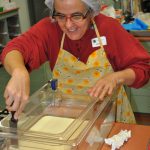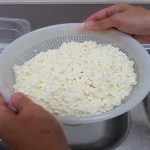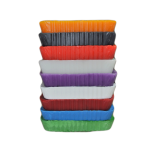Why do you need to keep the milk for making cheese: fresh, clean and cold? At the cheesemaking courses we always talk about the freshest milk and cream will always make better cheese than the same milk or cream that is several days old. You know that refrigerated milk will eventually spoil. The reason is that as milk ages in the fridge bacteria will grow and multiply even if it is kept very cold. This milk will not go sour as it ages it will go putrid, it has a real ‘yuk’ factor to it. Technically these bacteria that grow at refrigeration temperatures are called psychrotrophs.
Interestingly enough many of these psychrotrophic bacteria are not usually destroyed by pasteurisation. They live on in the milk, produce enzymes that digest the fats and proteins in the milk and with that comes flavours that are undesirable in the milk and subsequently the cheese made from that milk. So if your milk is stored for several days or more, these bacteria will grow and multiply and therefore produce increasing amounts of off flavours that will make their way into the cheese. Keeping the milk cold will slow down the rate of spoilage compared to keeping the milk at warmer temperatures.
An additional factor related to ‘freshest’ milk is that milk becomes stale as it ages. That means the great flavour that milk has as it comes straight from the cow diminishes as the milk ages. It does not totally disappear though.
Please note that the bacteria that cause spoilage are not food poisoning bacteria.
The reason for keeping milk clean is that dirty surfaces will allow greater numbers of these undesirable bacteria to get into the milk. Some of these bacteria may be spoilage and some may be food poisoning types.
There reason for keeping the milk cold is that these same bacteria will grow to greater numbers and produce more off flavours at higher storage temperatures.
So what do you need to do! A general industry standard is to give pasteurised milk 10 – 14 days shelf life (usually expressed as a best before date). If making cheese always select milk that is the freshest available, keep it in a chilled esky for the ride home, especially in summer and keep all equipment and utensils that come into contact with the milk clean and sanitise them before use.
An additional point, the acidity produced by the starter culture that you add to the cheese milk will grow best at warm temperatures and makes the milk sour as lactic acid develops. The starter bacteria have been specifically selected to make the milk go sour whereas the bacteria that grow because of poor fresh, clean and cold make the milk putrid.



